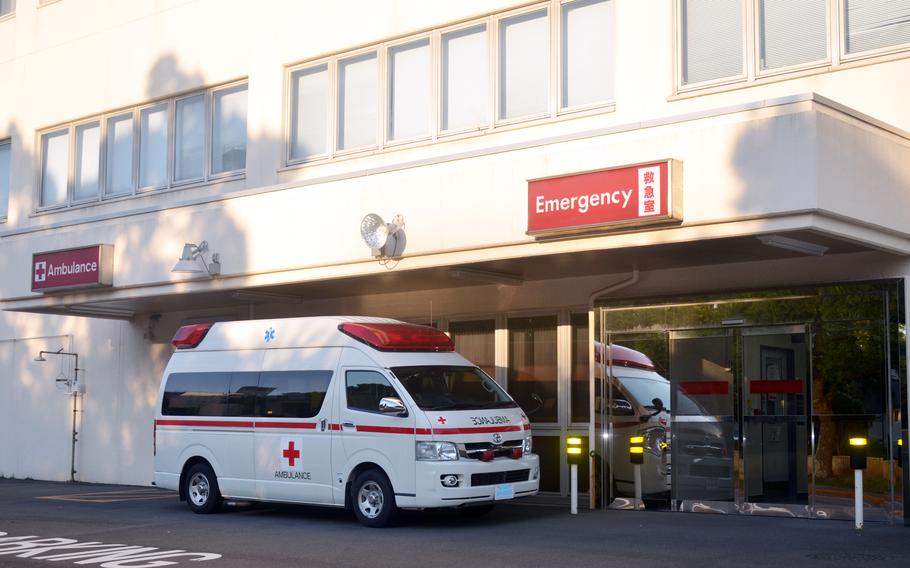
Active-duty troops and Defense Department civilians alike are have issues accessing health care at military treatment facilities world wide, according to a recent DOD Inspector General report. (Alex Wilson/Stars and Stripes)
The U.S. military community must navigate hurdles to access health care, both at home and abroad, according to a recent report from the Defense Department’s Office of the Inspector General.
Among the issues plaguing the military health care system are long wait times for appointments, understaffed facilities and a general lack of access to care, all of which are contributing to complaints and concerns, the Nov. 29 report said.
It recommends that the Defense Health Agency, which oversees all military treatment facilities, conduct a survey of health care providers and patients and use the results to help develop and implement a plan to “bring those provider networks into compliance” with Defense Department requirements.
For its report, the IG collected information from DHA, service audit agencies and inspectors general from the Army, Navy, Air Force and Marine Corps.
The results identified health care access issues in a variety of military communities, including Pearl Harbor, Hawaii; Lemoore, Calif.; Oak Harbor, Wash.; and Pensacola, Fla.
Smaller military treatment facilities “often only service active duty service members, and send all other beneficiaries, such as family members and retirees, to the TRICARE provider network,” according to data provided by the attorneys general.

U.S. Naval Hospital Okinawa at Camp Foster is pictured on June 9, 2023. (Stars and Stripes)
Additional data showed that some TRICARE networks “are not robust or adequate to meet this need and beneficiaries may have difficulty obtaining network care,” the IG’s report said.
Citing Naval Health Clinic Pearl Harbor in Hawaii as an example, the IG said the clinic accepts only active-duty service members and offers only limited specialty care.
Other patients are turned away and sent to the TRICARE network at large; however, the network in Hawaii has limited facilities when compared to places such as San Diego.
Specialty services in Hawaii also have appointment wait times that exceed DOD’s 28-day standard. Gastroenterology services, for example, take an average of 49 days and urology services can take an average of 67 days.
The IG also identified significant health care access issues for overseas military communities, specifically in Japan.
Problems there include the necessity of translation services, the lack of certain U.S. prescription medicines and the fact that medical services may not be available at all.
“Japanese medical facilities routinely and lawfully turn away patients when limited by medical staff, translation support, or when advanced payment cannot be secured, resulting in denial of care,” the report said.
U.S. insurance is often incompatible with Japan’s medical system or not accepted by Japanese doctors, the report said. Upfront payment is often required, making health care “cost prohibitive for some civilians.”
The issues aren’t just an inconvenience, they’re causing some DOD civilians to leave their jobs altogether.
Within a six-month period this year, at least eight Air Force civilian employees requested their tour in Japan be shortened due to health care access concerns, service officials told the IG. Another three declined job offers and two chose to relocate all together.
At the Department of Defense Education Activity, which manages base schools, at least 15 Japan-based teachers resigned from positions during the 2022-2023 school year, the report said. They cited access to health care as their reason.
In October, the Federal Education Association — a Washington, D.C.-based teachers union that represents DODEA employees — told Stars and Stripes that “a majority of our members in Japan are planning to retire or seek employment elsewhere because of the lack of on-base health care.”
FEA represents more than 600 DODEA employees in Japan, spokesman Gary Hritz told Stars and Stripes by email Oct. 11.
Because of these concerns, the IG is asking DHA’s director, Army Lt. Gen. Telita Crosland, to conduct surveys at installations worldwide to learn about the concerns of patients and providers alike.
Crosland did not provide a response to the recommendations prior to its publication, the report said, despite already receiving an extension to the IG’s original deadline.
The IG is asking Crosland to respond by Dec. 29 with details on her planned course of actions or alternative recommendations.
A spokesperson for DHA, headquartered in Virginia, did not immediately respond to Stars and Stripes’ request for comment Thursday.